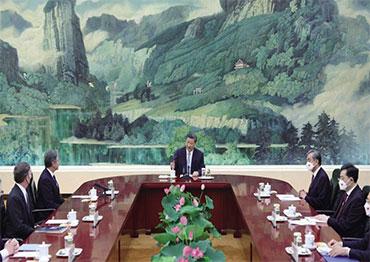Many hope that Blinken’s visit can inject some stability into the increasingly fragile ties between the two countries. But other than re-iterating the importance of stabilizing bilateral ties, it appears that that the two sides are still far apart on major issues.
In his meeting with Blinken, China’s top diplomat, State Councilor Wang Yi said that Blinken’s visit came at “a critical juncture in China-US relations, where a choice needs to be made between dialogue or confrontation, cooperation or conflict,” and called for the two countries to “reverse the downward spiral” in bilateral relations.
Stressing that the root cause of the deteriorating relations stem from the US’s misperceptions toward China, Wang said that the US must stop playing up the so-called “China threat,” card, lift illegal unilateral sanctions against China, stop suppressing China’s scientific and technological advances, and not wantonly interfere in China’s internal affairs.
Wang also reiterated the significance of the Taiwan question as “the core of China’s core interests.”
“On the Taiwan question, China has no room for compromise or concession,” Wang said, “The US must earnestly abide by the one-China principle set out in the three China-US joint communiqués, respect China’s sovereignty and territorial integrity, and unequivocally oppose ‘Taiwan independence.’”
Speaking to the press in Beijing during his visit on May 19, Blinken said that the US and China had made “progress” in “a whole variety of areas.” But according to a readout the White House released on Blinken’s visit to China, Blinken made it clear that the US will continue to “compete vigorously” with China, while managing the competition to prevent it from “veering into conflict.”
Reiterating the US concerns on China on various issues, Blinken said that the two sides agreed on further senior-level engagements in Washington and Beijing to continue open lines of communication. But Blinken admitted that there was “no immediate progress” on resuming direct talks between the defense ministers of the two countries.
On May 19, Yang Tao, director-general of the Chinese Foreign Ministry’s North American and Oceanian Affairs department, reiterated China’s demand for the US to adopt “an objective and rational perception of China” and lift its sanctions.
According to Wu Xinbo, a Professor and Dean of the Institute of International Studies with Shanghai-based Fudan University, as the 2024 presidential election campaign season is quickly approaching, the window of opportunity for the improvement of China-US relations is closing. The next keynote event to watch is the 2023 APEC Leaders’ Meeting Summit to be held in California in November.
So far, it remains unclear whether Chinese President Xi Jinping or other senior Chinese leaders will attend the event, the first APEC meeting to be held in the US since 2011.
“The biggest lesson the US can learn is that it cannot dictate the terms or timings of high-level interactions between the two countries,” Wu said, “It has to be a mutual decision.”

 Old Version
Old Version

